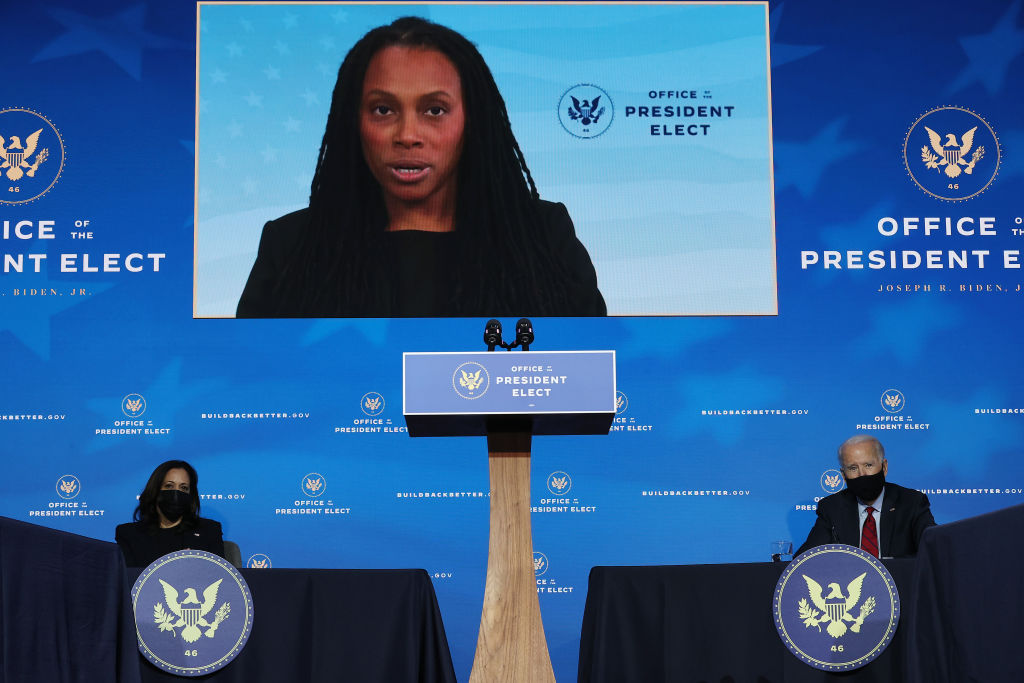
Dr. Marcella Nunez-Smith appears via video to talk about the COVID-19 pandemic alongside then- President-Elect Joe Biden and Vice President-elect Kamala Harris on Dec. 20, 2020, in Wilmington, Delaware. | Source: Chip Somodevilla / Getty
More than a year since the country first shutdown, and the pandemic rages on. Concerns about the spread of the new delta variant prompt a renewed push to boost vaccination rates.
Dr. Marcella Nunez-Smith, chair of the COVID-19 Health Equity Task Force, emphasizes how much the new variant has become a concern because it is easier to transmit and more aggressive than prior versions of the coronavirus.
Although some businesses and public offices maintain mask mandates and social distancing protocols, many local and state governments have removed protections. The rush to open could give the misconception that the pandemic is over.
“The pandemic isn’t over; the pandemic is shifting,” Nunez-Smith told NewsOne during an interview Tuesday. “And so it is becoming more and more urgent to be vaccinated to be protected from the delta variant and other variants.”
Identified first in India, the Centers for Disease Control (CDC) has also sounded the alarm about the delta variant. According to the CDC, the delta variant is on track to becoming the dominant version of the coronavirus in the United States. More than 50% of new COVID-19 cases are the delta variant.
Nunez-Smith explained that besides spreading more easily, the Delta variant could cause more significant disease.
“We have several communities in the country where Delta is already the dominant version, or strain, of the virus,” Nunez-Smith said. “It makes us take a deep sigh because it does possess the opportunity to threaten the progress that we’ve made as a nation already in terms of COVID-19.”
The best data available shows that current vaccines will protect against the new variant. But persisting disparities in vaccination rates, particularly among young people, remain a concern.
“The reality is unvaccinated people are at risk,” Nunez-Smith bluntly stated. “Taking a gamble with COVID could land you, of course, in the hospital, or worse. But it also can leave you with a month, or even longer of debilitating symptoms, that make it hard for people to work or function and just not feeling well.”
Nunez-Smith also explained that the delta variant is coming for young people in a way not seen with previous virus variations. She said she also wants to disrupt the misconception that COVID-19 is only a threat to older people.
“When we look at the UK, we see that people 12 to 20 are getting hit really hard by Delta,” Nunez-Smith said.
Dr. Rachel Villanueva, the incoming president of the National Medical Association, stressed that hesitancy isn’t the only obstacle. During a recent discussion held by the National Birth Equity Collaborative, Villanueva pointed to ongoing vaccine access issues.
“We know that when we’ve asked people in black and brown communities, they really just want to get more information,” Villanueva explained. “We want to understand what we’re taking. We want to understand what we’re giving to our family members and that it’s safe.”
Created in 1895, the National Medical Association is the oldest organization committed to serving Black doctors and their communities.
“We have access issues,” continued Villanueva. “We need to make sure that the vaccines are getting into the communities that need to get them and not allowing people from other communities to come in and get vaccinated at a higher rate, which we know has been occurring.”
Angela Aina, executive director of the Black Mamas Matter Alliance, also noted the need for increased investments in health communications and health care literacy, including equipping community-based providers with the information to answer questions about COVID-19 vaccines and the ongoing nature of the pandemic.
“Our government can be doing more investing back into the public health infrastructure, especially in this arena,” Aina said.
Speaking on rural access issues, Aina noted that many communities do not have easy access to some of the stores that may offer vaccine appointments.
“There’s not easy access to Kroger or to CVS,” said Aina. “A lot of our people are not always easily connected to those venues where the vaccine is currently being distributed.”
In her interview with NewsOne, Nunez-Smith agreed with the expert panel about responding to people’s questions and concerns with good verifiable information and continued public health education about the ongoing threat of COVID-19 and the benefits of vaccination.
She also pointed to efforts like an outreach campaign launched by relatives of those impacted by the Tuskegee experiment. Former Tuskegee Mayor Omar Neal told the Associated Press he wanted to save lives.
“I didn’t want people to use Tuskegee and what transpired there as a reason for not taking the vaccine,” explained Neal.
Neal’s uncle was among the Black men violated by the Tuskegee experiment. But Neal and other relatives want people to understand the history and how it differs from the current moment. This is particularly important as anti-vaccination groups target Black communities with misinformation labeled as proof of “medical apartheid.”
Asking questions is important. But once people have the information, Nunez-Smith advocates for an each one, teach one kind of approach to sharing good verifiable information and experiences with getting vaccinated.
“You got to get out, and you got to testify about it,” Nunez-Smith said.
LATEST POSTS:
- Join the LoveErica.com Community: Music, Ministry and Motivation
- Reflecting on My Experience Honoring Sandra Crouch | Ericaism
- 3 Ways Singles Can Grow Closer to God
- Reports Show Growing Number Of Young Adults Find The Bible Transformative In Their Lives
The Delta Variant Is On The Move: The Pandemic Isn’t Over, It’s Shifting was originally published on newsone.com












